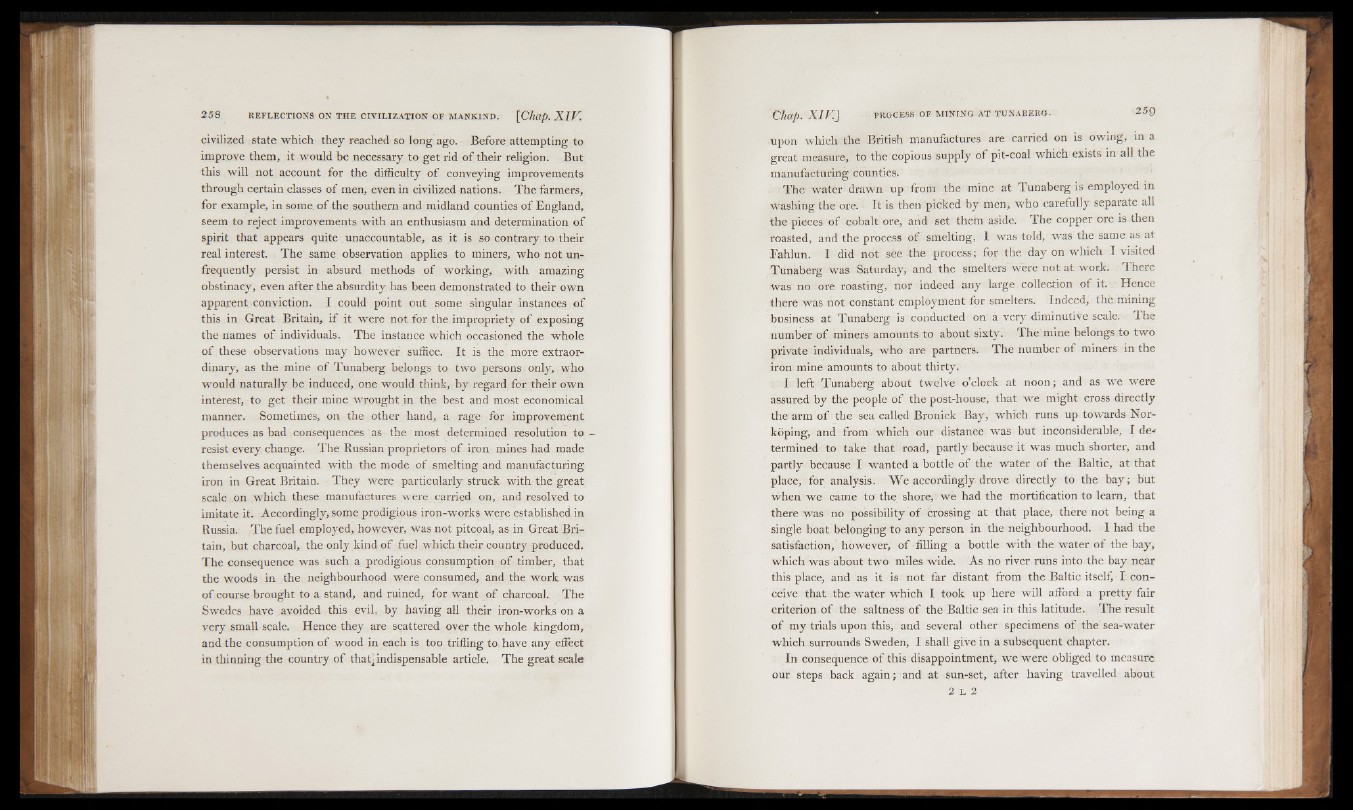
civilized state which they reached so long ago. Before attempting to
improve them, it would be necessary to get rid of their religion. But
this will not account for the difficulty o f conveying improvements
through certain classes o f men, even in civilized nations. The farmers,
for example, in some o f the southern and midland counties of England,
seem to reject improvements with an enthusiasm and determination of
spirit that appears quite unaccountable, as it is so contrary to their
real interest. The same observation applies to miners, who not un-
frequently persist in absurd methods o f working, with amazing
obstinacy, even after the absurdity has been demonstrated to their own
apparent conviction. I could point out some singular instances of
this in Great Britain, i f it were not for the impropriety o f exposing
the names o f individuals. The instance which occasioned the whole
of these observations may however suffice. It is the more extraordinary,
as the mine o f Tunaberg belongs to two persons only, who
would naturally be induced, one would think, by regard for their own
interest, to get their mine wrought in the best and most economical
manner. Sometimes, on the other hand, a rage for improvement
produces as bad consequences as the most determined resolution t o -
resist every change. The Russian proprietors o f iron mines had made
themselves acquainted with the mode o f smelting and manufacturing
iron in Great Britain. They were particularly struck with the great
scale on which these manufactures were carried on, and resolved to
imitate it. Accordingly, some prodigious iron-works were established in
Russia. The fuel employed, however, was not pitcoal, as in Great Britain,
but charcoal, the only kind of fuel which their country produced.
The consequence was such a prodigious consumption of timber, that
the woods in the neighbourhood were consumed, and the work was
of course brought to a stand, and ruined, for want of charcoal. The
Swedes have avoided this evil, by having all their ironrworks on a
very small scale. Hence they are scattered over the whole kingdom,
and the consumption o f wood in each is too trifling to have any effect
in thinning the country of that] indispensable article. The great scale
upon which the British manufactures are carried on is owing, in a
great measure, to the copious supply o f pit-coal which exists in all the
manufacturing counties.
The water drawn up from the mine at Tunaberg is employed in
Washing the ore. It is then picked by men, who carefully separate all
the pieces of cobalt ore, and set them aside. The copper ore is then
roasted, and the process of smelting, 1 was told, was the same as at
Fahlun. I did not see the process; for the day on which I visited
Tunaberg was Saturday, and the smelters were not at work. There
was no ore roasting, nor indeed any large collection o f it.. Hence
there was not constant employment for smelters. Indeed, the mining
business at Tunaberg is conducted on a very diminutive scale. The
number o f miners amounts to about sixty. The mine belongs to two
private individuals, who are partners. The number o f miners in the
iron mine amounts to about thirty.
I left Tunaberg about twelve o’clock at noon ; and as we were
assured by the people of the post-house, that we might cross directly
the arm of the sea called Bronick Bay, which runs up towards Nor-
koping, and from which our distance was but inconsiderable, I determined
to take that road, partly because it was much shorter, and
partly because I wanted a bottle o f the water of the Baltic, at that
place, for analysis. W e accordingly drove directly to the bay; but
when we came to the shore, we had the mortification to learn, that
there was no possibility of crossing at that place, there not being a
single boat belonging to any person in the neighbourhood. I had the
satisfaction, however, of filling a bottle with the water o f the bay,
which was about two miles wide. As no river runs into the bay near
this place, and as it is not far distant from the Baltic itself, I conceive
that the water which I took up here will afford a pretty fair
criterion o f the saltness of the Baltic sea in this latitude. The result
of my trials upon this, and several other specimens o f the sea-water
which surrounds Sweden, I shall give in a subsequent chapter.
In consequence of this disappointment, we were obliged to measure
our steps back again; and at sun-set, after having travelled about
2 l 2